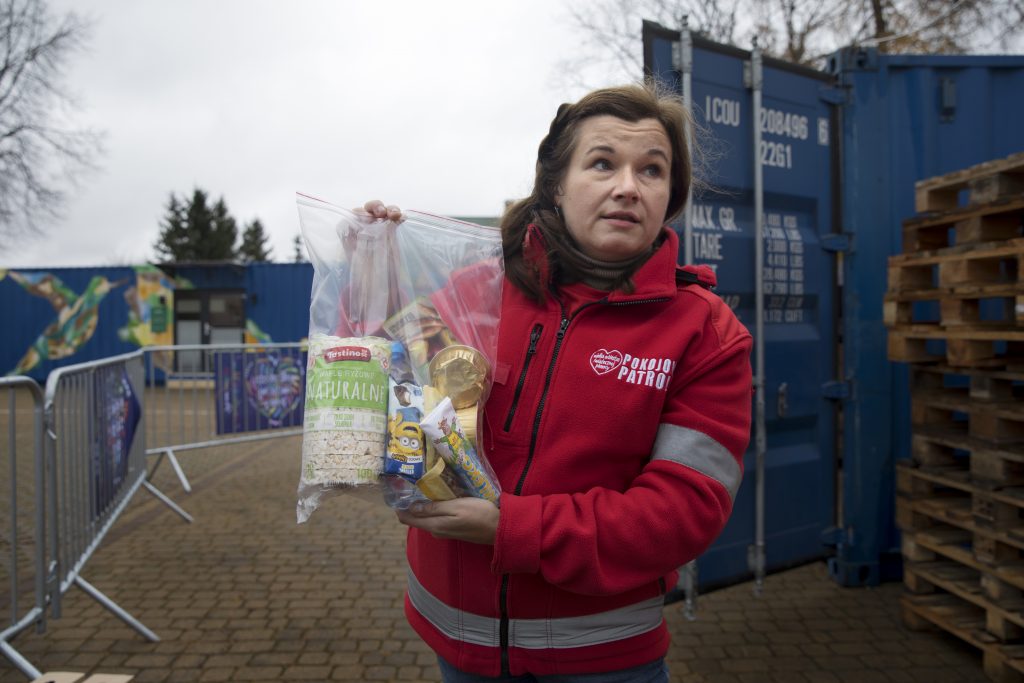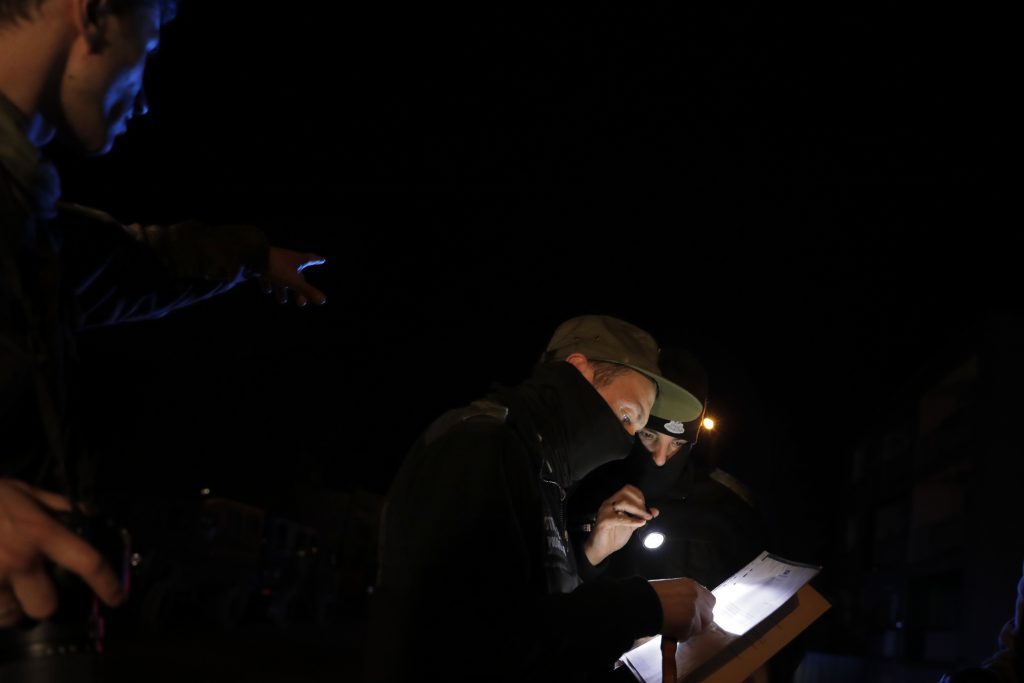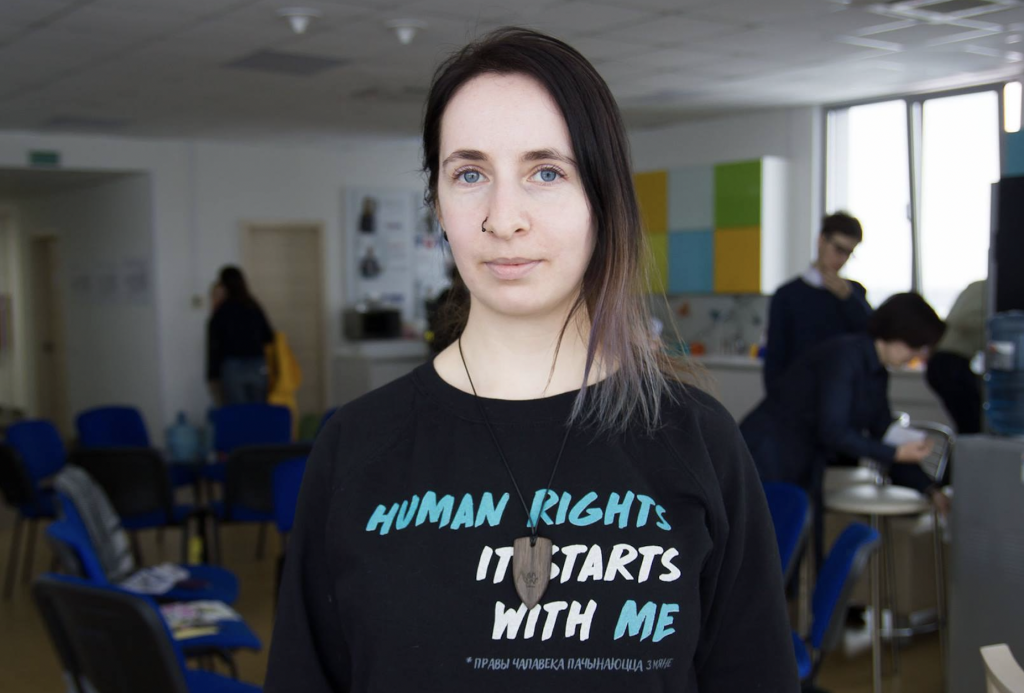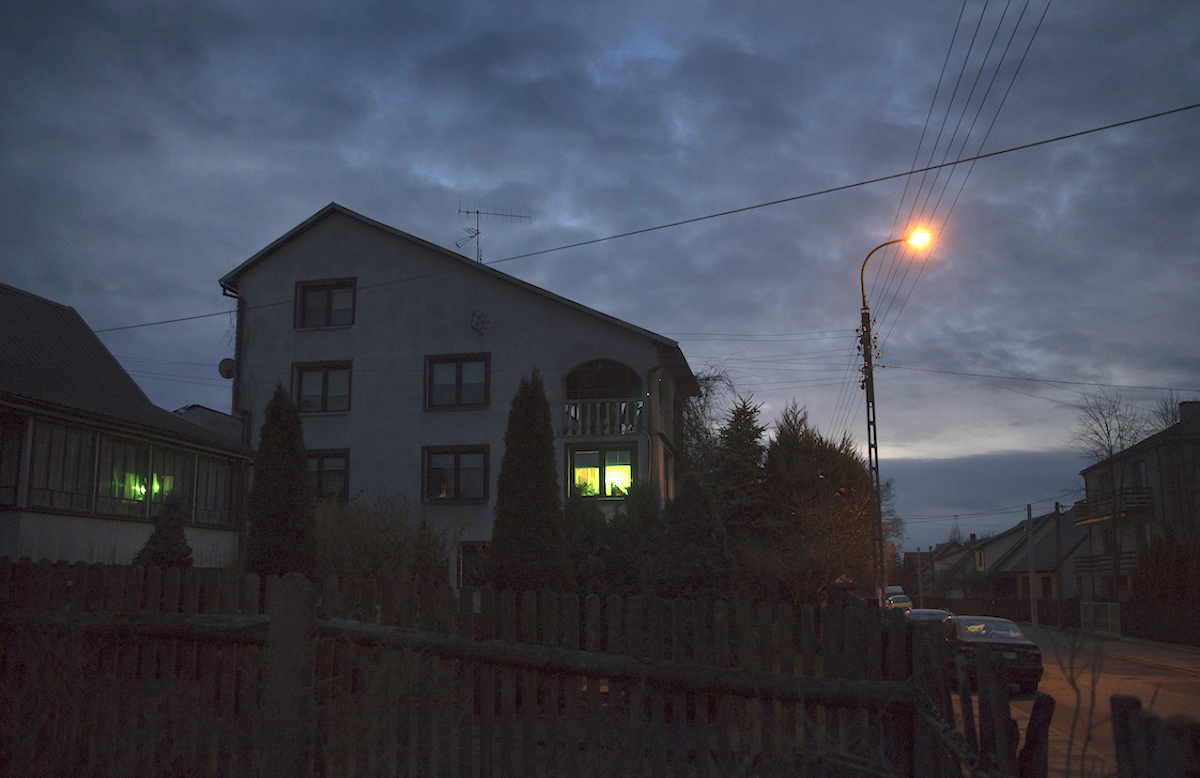This summer residents of Belarusian cities started noticing an unusual number of migrants on the streets – mainly near hotels and in markets. But now there are literally crowds of migrants in Minsk city center. Some of them even pitch their tents right in the courtyards and in the underground crossings. But no one has been paying attention to these people – neither passers-by, nor the police.
But the escalation on the Polish border in early November has made many Belarusians resentful of the foreigners. Footage of hundreds of migrants, mainly Iraqi Kurds, marching towards Poland, the huge camps along the barbed fence, and finally migrants throwing stones and logs at Polish border guards – all this could not but provoke emotions among Belarusians.
👉All the articles from this investigation
Memories of the Holocaust
“It became clear that all these migrants were blocked at the border. All of this was reminiscent of the Holocaust. Today you see hundreds of people near the bus station in Minsk, and a couple of days later, footage from the border appears. I understand that these are the same people,” Aryna told Voxeurop.
Together with her friends, Aryna tried to talk to migrants in Minsk city center, dissuading them from going to the border. Then Aryna found a group of migrants remaining in Minsk who were renting an apartment. She decided to help them as much as she could. Iraqi women from the apartment asked for food and warm clothing. After all, many have come from warm Iraq, not realizing how cold Belarus can be in November.
“I lost my job recently, but I still have a warm apartment to live in. I’m in a better position than the migrants are. I can somehow help them. Our common goal is to show that we are all humans,” Aryna says. “These people didn’t understand at all where they were going. What they quickly learned is that they were being used by the authorities and that the police in Belarus were bad”, she adds.
Helping with the permission of the authorities
Aryna, like other volunteers, helps migrants on her own, because the Belarusian authorities do not appear to see the issue as a problem. After all, it was the Belarusian authorities who created this crisis.
At the same time, political repression against active citizens continues in Belarus, and the majority of NGOs are already shut down. Including those which were involved in helping migrants.
“The Red Cross remains, but it cooperates with the authorities. I don't know how safe it is to go there,” Aryna says.
But when you turn on state TV channels, you would be surprised to see the authorities allegedly helping migrants. Pro-Lukashenka politicians come to the border and provide food and clothes.
“This is very hypocritical. First, migrants are forced into a cold forest by the military and border guards, and then the authorities say that migrants need help,” Yahor said.

Human-rights activist Nasta Lojka says that the authorities have adopted a humanitarian position towards migrants, but don’t let others bring the aid. Until recently, Nasta worked for the Human Constanta organisation, which was involved in helping migrants. However, like many other NGOs, Human Constanta was closed by the authorities. The few remaining organisations of this kind are afraid to start a campaign to help migrants – anyone could find themself persecuted for a public initiative not sanctioned by the Belarusian authorities.
It’s just scary to offer help to migrants. The border officials are guarding them like slaves. We had a couple of people going to the border crossing, offering to bring the families of migrants to their home. But no one listened to them. The migrants are under the full control of the security forces
Aliaksandr, a resident of the village of Karobčycy
“We are individually trying to provide assistance to migrants. It is impossible to get to the border now, so we go to where they live in Minsk,” Lojka says.
Many villages are located near the Bruzhi border crossing, where thousands of migrants are stuck. Some locals would like to feed migrants and even lodge them in their homes. But according to the locals, doing so could be dangerous for themselves.
“You know, it’s just scary to offer help to migrants. The border officials are guarding them like slaves. We had a couple of people going to the border crossing, offering to bring the families of migrants to their home. But no one listened to them. The migrants are under the full control of the security forces,” Aliaksandr, a resident of the village of Karobčycy, which is 10 km from the migrant camp, told Voxeurop.
A public debate about migrants
“I don’t understand why we have to help people who throw stones at Polish border guards, who go with logs to ram the state border,” Volha told Voxeurop. She works at a school in the city of Hrodna and like many others was ordered by her boss to donate money for blankets and warm clothes for migrants.
Coerced humanitarian aid, organized by the authorities, has aroused resentment instead of sympathy for the migrants. Even among Belarusian liberal opinion-makers, one can often hear anti-migrant sentiment. The migrants are called Lukashenka's accomplices, they are accused of ignorance of the Belarusian realities, they have only themselves to blame for the current situation.
“We are terra incognita for migrants. They believe in fairy tales about a Germany that will save them. People are basically illiterate, they have little idea where they have come.” Aryna is trying to understand the behavior of migrants after spending a week with them in Minsk.
The cautious and even embittered attitude of Belarusians towards migrants can be explained by the ethnic composition of Belarusian society, believes Yury Drakakhrust, a political observer for the Belarusian service of Radio Free Europe/Radio Liberty. Belarusians make up to 85% of the population. Another 13% are neighboring ethnic groups: Russians, Poles and Ukrainians. It is very rare to see a non-Slavic person on the street in Minsk or any other city. In addition, all previous waves of migration to Europe have always bypassed Belarus.

“Belarusian society is not adapted to migrants, it simply does not have such experience,” Yury Drakakhrust, a political observer for the Belarusian service of Radio Free Europe/Radio Liberty, told Voxeurop. To prove it, he cites data from a survey on attitudes to migrants, conducted in 2016. When asked what Europe should do with refugees, 60% of Belarusians answered that the refugees should be sent back. Moreover, attitudes towards refugees did not depend on political views: both Lukashenka supporters and the opposition-minded part of the population had strong anti-migrant attitudes back in 2016.
“Therefore, I am not surprised by the anti-migrant rhetoric today. Indeed, even among the traditional Belarusian opposition there are very strong conservative components. There are people there with views close to the Polish PiS, France’s Marine Le Pen and even the German AFD,” Drakakhrust said.
On the contrary, Drakakhrust is rather surprised to hear so many voices among Belarusians calling for more active help to migrants.
“I think with such disputes we find ourselves within the same framework as other Europeans. We need a tremendous spiritual and cultural effort, we need public debate on this topic. After all, when democracy is established and Belarus flourishes, the country will become a magnet for migrants,” Drakakhrust said.
Not safe for migrants
However, Poland, where most migrants from Belarus are now trying to get, is not a safe place. For as long as it was possible, Polish volunteers and local residents helped migrants by giving them food and clothing. But after the state of emergency was introduced in the border regions of Poland, access to the migrants became too difficult.
Piotr Bystranin, head of the Ocalenie Foundation (Rescue Foundation), has just returned from the border region. According to him, volunteers can now be found only a few kilometers from the border – where the state of emergency zone ends.
In terms of physical violence, Belarus is more dangerous for refugees. From the Polish border guards the violence would be in pushing migrants back to Belarus. Therefore, I would say that none of these countries is safe for migrants.
Piotr Bystranin, head of the Ocalenie Foundation
“We can reach migrants only if they get outside this zone. To such people we give food, water, and we call for medics if they need such assistance. We also help those who decide to stay in Poland and ask for international protection here,” Bystranin told Voxeurop. “But from the side of the authorities we are facing persecution. I know that volunteers and medics near the border are being watched. Some were threatened and ordered to leave, even though they were not breaking the law.”
According to Bystranin, several hundred migrants passed through the Ocalenie Foundation alone and received help from volunteers. But few of them decide to ask for international protection in Poland. Most still try to get to Germany.
“In terms of physical violence, Belarus is more dangerous for refugees. From the Polish border guards the violence would be in pushing migrants back to Belarus. Therefore, I would say that none of these countries is safe for migrants,” Bystranin said.

Migrants become desperate after arriving in Belarus
“We don't know what to do next. We no longer have money to stay in Minsk,” a young woman who introduced herself as Dila told Voxeurop.
Dila and her family flew to Minsk two weeks ago. After they saw violent videos from the border, they decided not to go there. However, her family will not be able to stay in Minsk for a long time either – they did not expect they would have to rent an apartment for so long.
“The people we see at the border are often the ones who went there out of desperation. They just have nowhere else to go. They had nothing left at home in Iraq – they staked everything on getting to Germany,” Aryna said.
Allowing Iraqi and Syrian migrants to stay in Belarus would solve the humanitarian crisis. Nasta Lojka believes that this could be the most logical decision in this situation. Indeed, many of those who came to Belarus are genuinely in danger in their homeland.
“We do not believe that Belarus is a completely safe country for them. But it’s better than living in a forest or in a logistics center,” Lojka said.

But such acts of humanity from the Belarusian authorities can only be expected if it is beneficial for Lukashenka and his circle. In this regard, the fate of migrants in Belarus is similar to the fate of hundreds of Belarusian political prisoners, Nasta Lojka points out. “Both have become hostages of the Belarusian authorities. Both political prisoners and migrants have a very unclear future, they are helpless. And there is little we can do to help them. And in both cases, the Belarusian authorities are responsible for the current situation,” Lojka said.
‘I could have died in the forest in Belarus’
27-year-old Musa is among over ten thousand migrants who managed to cross the border and come to Germany. He is now staying at the camp at Eisenhüttenstadt - a town on the border of Germany and Poland.
“I’m very lucky I’m in Germany now. Police are good here. No one beats us, like in Poland and Belarus. If I hadn’t come here, I could have died in the forest in Belarus,” Musa told Voxeurop.
Musa came to Belarus in mid-September from Erbil in Iraqi Kurdistan. With a group of other Kurds, he came to the border with a Belarusian guide -– an unknown man in a uniform. Once at the border, Belarusian guards met migrants and showed them the way to Poland. But it wasn’t easy to get there, as they were promised. For almost two weeks Musa and his countrymen lived in the forest near the border. Polish soldiers were pushing migrants back to Belarus while Belarusian border guards with shields refused to allow them back in.
“Polish soldiers told us if we come again we’ll be dead”, Musa said.
But then, one night, Musa and a dozen Kurds managed to sneak through the border and make it to Poland. They had a GPS location of a van which brought them to Germany, a drive that took about 10 hours. For almost two months he has been staying in the camp in the town of Eisenhüttenstadt.
“Now I’m waiting for my new documents, then I’ll go to another camp. I want to learn German and get a job here. I’m a young man and I can work”, Musa said.
He now remembers Belarus as a bad dream. He did not expect it would be so hard to get to Germany. After watching water cannons and tear gas being used against migrants on the Polish-Belarusian border, he realized how lucky he had been to finally get across before the winter cold and the escalation by the authorities.
“I’m safe here, but still feel very stressed when I read the news about Kurds on the border,” he says. “People are treated like slaves there.”

With the support of the Evens Foundation
Was this article useful? If so we are delighted!
It is freely available because we believe that the right to free and independent information is essential for democracy. But this right is not guaranteed forever, and independence comes at a cost. We need your support in order to continue publishing independent, multilingual news for all Europeans.
Discover our subscription offers and their exclusive benefits and become a member of our community now!















